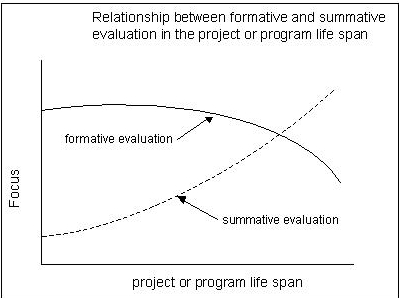|
|||||||||
Functions of evaluation
Evaluations can be distinguished according to their (main) functions:
Formative and summative evaluation
"When the cook tastes the soup, that's formative; when the guests
taste the soup, that's summative." Bob Stake
Formative evaluation accompanies the development process, it serves the purpose of quality assurance. Its primary goal is to identify the strengths and weaknesses of the implementation. It provides data "which is used to optimise the design of an educational course" (translated from Tergan, 2000).
"Summative evaluation ensures the [subsequent] control of quality, effects and utility of an educational course. The question of interest is whether an educational course or individual components of the course can meet certain expectations in practice" (translated from Tergan, 2000).
Formative and summative
evaluations can complement each other. At the beginning and during a project,
formative evaluation usually plays a greater role; towards the end, summative function often receives greater emphasis (cf. illustration, found in Worthen, Sanders & Fitzpatrick, 1997).

Knowledge-generating evaluation
Knowledge-generating
evaluation aims to answer questions of general interest. Hence, knowledge-generating
evaluation is very close to scientific (concomitant) research. To ensure the validity and generalisation of results, 'strong' study designs are
necessary (Chelimsky, 1997).
